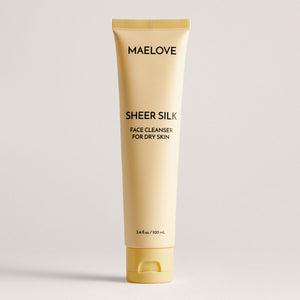Nowadays, it seems like everyone is touting the benefits of hyaluronic acid.
If you've tried a serum with hyaluronic acid, you may have loved the gel-like texture and how hydrating it was. You may also find that your cream contains this ingredient.
Is hyaluronic acid actually great? What is it, and how does it work? Well, read on to find out!
We think hyaluronic acid is great (as an ingredient in topical skincare products)
And there are two main reasons why:
The first is that it can hold an incredible amount of water. In fact, it can attract and hold up to 1,000 times its own weight in water!
This water-holding ability is so incredible and unique in nature that hyaluronic acid is naturally found in many organisms, including humans. That's why it's sometimes called "nature's moisturizer."
The second reason is that because it's natural to the human body, it's universally well-tolerated and won't cause allergic reactions.
In other words, even if you have sensitive skin or an inflammatory skin condition like rosacea, psoriasis, or eczema, your skin will be able to tolerate hyaluronic acid.
So, whether in a serum or a cream, hyaluronic acid is a good moisturizing ingredient that is well-tolerated.
What exactly is Hyaluronic Acid?
When we see the word "acid," our minds may conjure up images of exfoliating acids, such as hydroxy acids like glycolic acid, lactic acid, or salicylic acid. Or maybe your mind is conjuring up something even more frightening, like hydrochloric acid, which can burn skin.
Hyaluronic acid is made up of two types of sugar molecules that repeat over and over. These sugars are called d-Glucuronic acid and d-N-acetylglucosamine. Don't worry if you can't pronounce them :)
These sugar molecules join together to form chains (referred to as polysaccharides). These chains can get really long - sometimes thousands of sugar molecules long.
What's special about hyaluronic acid is how it acts in water. When mixed with water, it can stretch out into long, loose chains.
Then these long chains can intertwine together forming a jelly that allows hyaluronic acid to hold 1000 times its weight in water.
This water attracting and holding property makes it an amazing “humectant” that has many uses including the hydration of skin. Humectants are usually incorporated into moisturizing serums and creams because they can hold onto water to help hydrate the skin.
*A side note: Glycerin, urea, and panthenol (provitamin B5) are other very commonly used humectants in skincare.
How is Hyaluronic Acid good for aging skin?
Hyaluronic acid, found throughout the body, is most concentrated in the skin, where it helps retain moisture.
As we age, levels of hyaluronic acid decrease, leading to dry skin, but using hydrating serums and creams with hyaluronic acid can help maintain skin hydration.
Hyaluronic acid is found all over the human body, including the umbilical cord, joint fluid, eye fluid, and your skin. It is also in all body tissues like bones, heart valves, and lungs. However, 50% of your body's hyaluronic acid is in your skin.
In the skin, hyaluronic acid is one of the glycosaminoglycans (GAGs) that are naturally present and functions to hold water and keep the skin hydrated.
*A side note: Other GAGs include dermatan sulfate, chondroiton 4-sulfate and chondroitin-6 sulfate.
Hyaluronic acid is the most predominant glycosaminoglycan (GAG) in the body.
Unfortunately, as you age, the natural levels of GAGs like hyaluronic acid decrease, reducing your skin’s ability to retain water. UV damage further worsens this issue. Combined with the natural decline of waterproofing lipids like ceramides, the result is dry skin.
One solution to dry skin is using hydrating serums and creams applied topically. Humectants like hyaluronic acid attract and retain water, while waterproofing lipids such as ceramides, oils, waxes, and fats help prevent water evaporation.
Applying a topical product containing hyaluronic acid essentially hydrates the surface of your skin and creates a humid microenvironment. This increases the moisture content within the skin and reduces water evaporation.
Topical retinoids will also increase hyaluronic acid in the skin and this is part of how retinoids helps improve wrinkles. So if you want to increase hyaluronic acid levels inside the skin, try a retinoid like retinaldehyde (aka retinal), retinol, or tretinoin.
How best to use Hyaluronic acid products?
Hyaluronic acid plays well with other ingredients whether it is in a serum or a cream.
When using a serum, you can layer it with other serums, applying them from the thinnest to the thickest texture (watery to gel-like). If it is in a cream, apply the cream after your serums to lock in moisture.
*A side note: You can check out our How to layer guide here
If you are in a very dry environment, such as an arid climate, during winter, or on an airplane, spritz your skin with water before applying a hyaluronic acid product.
Since hyaluronic acid effectively attracts and retains water, this will ensure it draws moisture from the environment rather than from your skin, creating a hydrating microenvironment at the skin surface.
If you start using your hyaluronic acid serums or creams soon after you buy them, you can keep them at room temperature. However, if you won't use them for a while, store the serums and creams in the refrigerator.
If you're interested in hyaluronic acid:
At Maelove, we have a specialty hyaluronic acid serum that also contains panthenol called The Hydrator [check out Hydrator B5 Gel].
However, you will also find it in featured in a number of our other products including
Glow Maker Vitamin C serum [Link]
Peptide Squad Serum [Link]
Eye Enhancer de-puffing cream [Link]
Night Renewer glycolic acid cream [Link]
Plush lightweight moisturizing cream [Link]
Sheer Silk ceramide cleanser [Link]
If you would like much more in-depth discussions as well as scientific references, we'll be publishing our Deep Guide to Hyaluronic Acid soon. Stay tuned!





